Politics
Jill Stein vs. The Establishment: Can She Win in 2024?
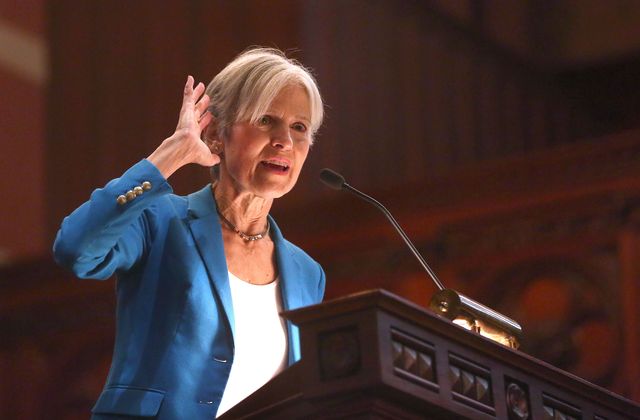
Dr. Jill Stein is a prominent figure in American politics, known for her advocacy in environmental issues, healthcare reform, and leadership within the Green Party. With an extensive background as a physician and environmental activist, Stein has been a key voice in progressive politics for over two decades. Her run for president in the 2024 election marks her third bid for the White House after previous campaigns in 2012 and 2016. Throughout her political career, Stein has pushed for policies that challenge corporate power, promote ecological sustainability, and ensure social justice. This article will delve into her background, political views, key campaign issues, and the impact she hopes to have in the 2024 election.
Jill Stein’s Early Life and Education
Born on May 14, 1950, in Chicago, Illinois, Jill Stein grew up in a Reform Jewish household in Highland Park, Illinois. Stein’s upbringing was rooted in education and public service, values that would shape her later career. She attended Harvard University, where she graduated magna cum laude in 1973, earning a degree in psychology, sociology, and anthropology. Is Jill Stein Jewish? Yes, her Jewish heritage has been a part of her identity, although her political focus has always been more global and centered on issues that impact the broader public.
Following her undergraduate studies, Stein went on to attend Harvard Medical School, where she earned her medical degree in 1979. She then embarked on a career in internal medicine, practicing for 25 years. Stein’s medical career gave her insight into public health issues, particularly the links between environmental factors and human health. Her concerns about these connections eventually led her into political activism.
From Activism to Politics
Stein’s transition from physician to activist began in the 1990s when she became increasingly concerned about the environmental impacts of pollution on public health. One of her early activism campaigns involved protesting against the “Filthy Five,” a group of coal plants in Massachusetts that were major contributors to air pollution. Stein’s activism earned her recognition and several awards, including Clean Water Action’s “Children’s Health Hero Award” and the Toxic Action Center’s “Citizen Award.”
Her involvement in environmental causes eventually led to her first foray into politics. In 2002, Stein ran as the Green-Rainbow Party candidate for governor of Massachusetts. While she did not win, the campaign helped raise awareness about environmental and social justice issues in the state. Stein would go on to run for other offices, including Massachusetts Secretary of the Commonwealth in 2006 and governor again in 2010. Though she didn’t win these elections, her efforts laid the foundation for her later national campaigns.
Jill Stein’s Presidential Campaigns: 2012 and 2016
Stein’s first national political campaign came in 2012 when she ran for president under the Green Party banner. Her platform emphasized environmental sustainability, economic justice, and healthcare reform. Stein received 469,015 votes, which accounted for 0.36% of the popular vote. Although her vote share was small, her campaign drew attention to the Green Party and provided a progressive alternative to the mainstream political discourse dominated by the Democratic and Republican parties.
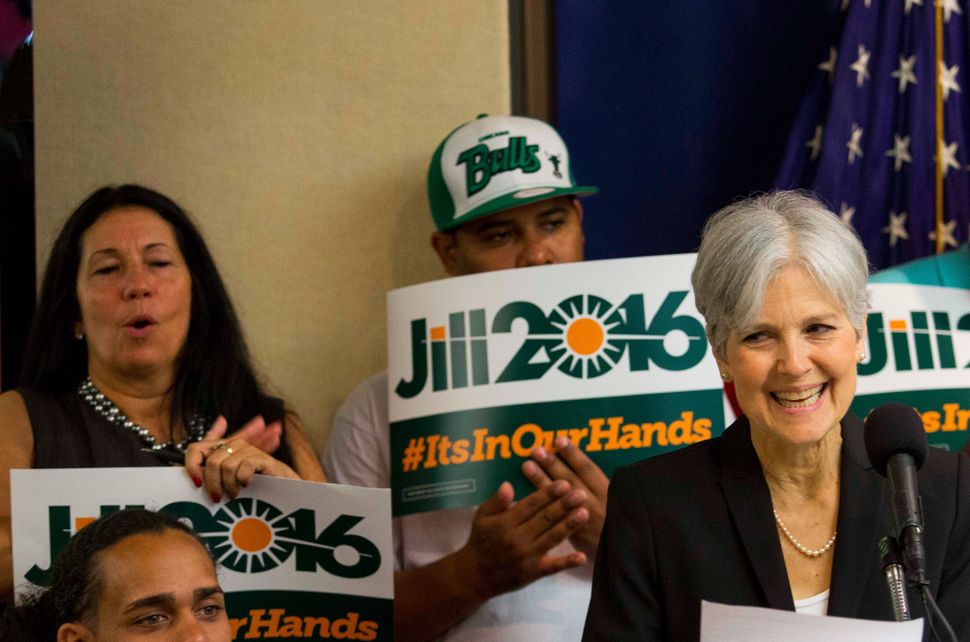
Jill Stein Presidential Campaign: 2012 and 2016
Jill Stein Russia became a topic of controversy after her 2016 campaign when it was revealed that Stein attended a 2015 dinner in Moscow hosted by RT (formerly Russia Today). At this dinner, she was seated next to Russian President Vladimir Putin and former National Security Advisor Michael Flynn. The event led to questions about her views on U.S.-Russia relations, though Stein has consistently maintained that her foreign policy stance is rooted in diplomacy and peace, rather than military intervention.
During the 2016 presidential election, Stein’s platform focused on a Green New Deal, universal healthcare, student debt cancellation, and electoral reform. Her campaign gained more traction than in 2012, receiving 1.45 million votes, or 1.07% of the popular vote. Many wondered, “Can Jill Stein win?” Despite not being able to break into the two-party system, Stein’s policies resonated with a growing number of Americans seeking alternatives to the Democratic and Republican parties.
Stein’s presidential campaign 2024 represents her third bid for the presidency. This time, she is focusing on an even more comprehensive version of the Green New Deal, emphasizing its ecosocialist underpinnings. Her platform includes bold proposals such as cutting military spending by 50%, investing in renewable energy, and providing a universal basic income.
Jill Stein’s Political Views and Policy Proposals
Is Jill Stein running for president in 2024? Yes, and her campaign continues to push for transformative policies aimed at addressing the most pressing issues of our time. Stein’s political views can be broadly categorized into environmental, economic, and social justice issues. Here are some of the key areas she is focusing on:
1. Green New Deal
Stein’s Green New Deal is perhaps the cornerstone of her campaign. This plan aims to transition the United States to 100% renewable energy by 2035, create millions of jobs in green industries, and address the climate crisis with the urgency it demands. Unlike other versions of the Green New Deal proposed by mainstream politicians, Stein’s plan is rooted in ecosocialist principles, which means addressing not only environmental issues but also economic inequality and systemic injustice.
2. Universal Healthcare
Stein has long been a proponent of Medicare for All, a single-payer healthcare system that would provide comprehensive coverage to all Americans. She believes that healthcare is a human right and that the current system, dominated by private insurance companies, leaves too many people without access to essential medical services.
3. Economic Justice
Stein’s economic platform includes a living wage, the cancellation of student debt, and the expansion of workers’ rights. She supports progressive taxation, where the wealthiest individuals and corporations pay their fair share to fund social programs that benefit the entire population. Stein’s economic vision also includes the Homes Guarantee, which seeks to ensure affordable housing for all.
4. Foreign Policy
Stein’s foreign policy is focused on non-intervention and diplomacy. She has been critical of U.S. military actions around the world and advocates for a significant reduction in defense spending. Stein calls for the U.S. to close its overseas military bases, end arms sales to human rights violators, and lead efforts for global nuclear disarmament.
Electoral Impact and Challenges
Despite the growing interest in third-party candidates, breaking through the dominance of the two major parties in the U.S. remains a significant challenge. Can Jill Stein win? While her ideas resonate with a substantial segment of the electorate, the structural barriers facing third-party candidates in the U.S. electoral system make it difficult for her to gain widespread traction. However, Stein’s campaigns continue to influence the national conversation on issues like climate change, healthcare, and economic inequality.
The Controversies: Jill Stein and Russia
As mentioned earlier, Jill Stein Russia became a subject of media scrutiny after her 2016 campaign. Critics raised concerns about her involvement in a Moscow dinner alongside Putin and Flynn. However, Stein has firmly denied any wrongdoing and emphasizes her consistent position advocating for peace and diplomacy in international relations. The controversy did not significantly derail her political career, but it remains a topic that her critics point to when questioning her foreign policy credentials.
Personal Life
How old is Jill Stein? At 74, Stein remains active in both politics and activism. She is married to Richard Rohrer, also a physician, and they have two sons. Stein continues to live in Lexington, Massachusetts, where she balances her personal life with her political and activist endeavors.
Conclusion
Dr. Jill Stein remains a powerful voice in progressive politics, advocating for bold policies that challenge the status quo. As she embarks on her presidential campaign 2024, Stein continues to focus on issues that matter most to her supporters: environmental sustainability, social justice, and economic reform. While Jill Stein polls may not yet show her as a frontrunner, her influence on the national dialogue around these issues cannot be denied. Whether or not Jill Stein can win in 2024, her campaigns push the envelope on progressive policy ideas, and she remains a key figure in the fight for systemic change in American politics.
Elections
Mojtaba Khamenei Iran’s Likely Next Supreme Leader
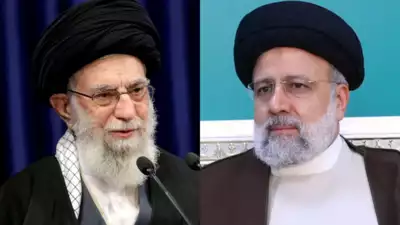
Iran’s Preeminent Chief, Ayatollah Ali Khamenei, is supposedly unwell, starting conversations about who will succeed him. At 85 years of age, Khamenei is said to have chosen to step down, picking his child, Mojtaba Khamenei, as the following Incomparable Pioneer. This advancement has caused critical discussion and hypothesis inside Iran and all over the planet.
On September 26, 2024, a gathering of the Get together of Specialists, a 60-part body liable for choosing Iran’s Preeminent Chief, was met at Khamenei’s solicitation. During the meeting, the gathering was approached to go with a secret and quick choice in regards to the initiative change. Reports propose that Mojtaba was collectively picked as the replacement. Notwithstanding, a few individuals communicated disappointment with the choice and the cycle, charging they were compelled into understanding, with cases of pressure and even dangers.
Mojtaba Khamenei was brought into the world in 1969 in Mashhad and is the second child of Ayatollah Khamenei. He concentrated on religious philosophy under his dad and other persuasive pastors and in the long run turned into an educator at the Qom theological college, where he keeps on instructing today. Mojtaba is hitched to Zahra Haddad-Adel, and several has three kids. His connections to the strict and political first class in Iran make him an eminent figure in the country’s initiative scene.
Throughout the long term, Mojtaba has confronted analysis and debate for his political inclusion. He assumed a significant part in supporting Mahmoud Ahmadinejad during the official decisions in 2005 and 2009. After Ahmadinejad’s triumph in 2009, far and wide fights emitted, and Mojtaba was supposedly associated with driving endeavors to smother these exhibits. Notwithstanding, his relationship with Ahmadinejad later decayed when the previous president blamed Mojtaba for stealing state reserves, which spoiled his picture.
While Mojtaba’s choice as the following Preeminent Pioneer appears to line up with his dad’s desires, it has not been without challenges. The Gathering of Specialists, however to a great extent stately, is supposed to assume a part in endorsing authority changes. Reports demonstrate disagree among individuals about Mojtaba’s reasonableness for the position, raising worries about his capacity to lead Iran actually and join its different groups. Pundits likewise question whether his impact and assets, supposedly significant, are adequate to guarantee a smooth progress.
Mojtaba’s potential authority brings blended responses. Allies contend that he offers progression and offers his dad’s vision for Iran. Pundits, notwithstanding, dread that his questionable history and absence of more extensive political experience could extend existing divisions inside the country’s political foundation. Some additionally stress over the authenticity of his arrangement, given the mystery and strain encompassing the choice cycle.
As Iran gets ready for a potential initiative change, the world watches intently. The choice to name Mojtaba as Preeminent Pioneer could have extensive results, molding Iran’s homegrown and worldwide arrangements for quite a long time into the future. While the change stays questionable, it is without a doubt a critical crossroads in the nation’s set of experiences.
Politics
Trump Turns Town Hall into Musical Spectacle, Raising Eyebrows Ahead of 2024 Election
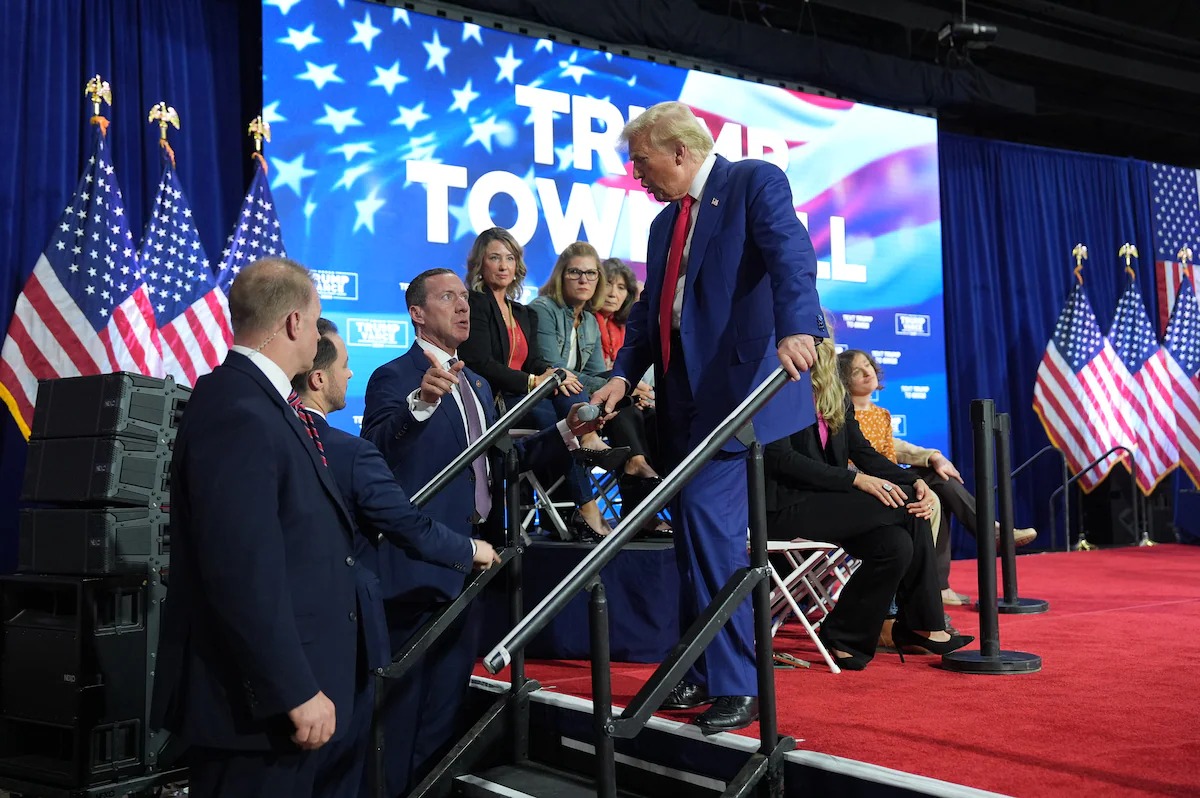
Trump’s Unusual Town Hall in Pennsylvania: A Musical Detour Instead of Political Dialogue
OAKS, Pa. — In what turned out to be an unexpected and unconventional town hall, former President Donald Trump surprised his audience in Oaks, Pennsylvania, by turning a political event into a musical session. Scheduled for October 14, 2024, the town hall began like any other, with Trump answering questions on housing affordability and small businesses. But what started as a routine political discourse quickly took an unexpected turn after two medical emergencies in the audience caused Trump to shift the event’s focus entirely.
Rather than continue answering questions, Trump opted to engage the audience with a half-hour-long playlist of his favorite songs. Swaying and dancing to the tunes, Trump transformed the event into a personal jam session, baffling some attendees and captivating others. This peculiar turn of events came at a crucial moment as the 2024 election looms just 22 days away.
A Bizarre Shift in Focus: Music Over Questions
Moderated by South Dakota Governor Kristi L. Noem, the event initially followed the format of most town halls, with attendees asking preselected questions. Trump, known for his long-winded and often meandering answers, began responding to queries about pressing issues like housing and small business support. However, when two attendees required medical attention within a short span of time, the focus of the town hall shifted dramatically.
Rather than continuing with the political dialogue, Trump took a more lighthearted approach. “Let’s not do any more questions. Let’s just listen to music. Let’s make it into a music,” Trump joked to the crowd, suggesting that nobody really wanted to hear more questions anyway. This marked the beginning of a 39-minute segment where Trump swayed, bopped, and gestured to the audience as his self-curated playlist blared from the speakers.
Governor Noem stood beside Trump on stage, occasionally nodding along to the music with her hands clasped. Meanwhile, Trump moved back and forth, engaging with the crowd in what felt like a living-room listening session rather than a high-stakes political event.
A Playlist That Took Center Stage
For nearly 40 minutes, Trump played nine tracks from his personal playlist, some of which have long been staples at his rallies. James Brown’s “It’s a Man’s Man’s Man’s World” and Sinéad O’Connor’s “Nothing Compares 2 U” were among the tracks that filled the air, while Trump occasionally paused to speak.
This wasn’t the first time Trump has shown a strong attachment to his playlist. Over the years, aides have described him as an amateur DJ, curating music on his campaign plane or at Mar-a-Lago. His love for certain songs has even caused tensions with artists who requested he stop using their music at political events. Despite the controversies, Trump has remained undeterred in using his favorite tracks to connect with his supporters.
As he danced and swayed on stage, the crowd appeared divided. Some audience members began to leave, unsure of how much longer the event would last or if Trump would return to the political discussion. Others stayed, recording videos on their phones, seemingly entertained by the impromptu concert.
Trump’s decision to forego questions and instead turn the town hall into a music session struck some as bizarre, especially given the timing. With the 2024 election just around the corner, and Vice President Kamala Harris recently questioning Trump’s mental stability, the move raised eyebrows. Harris, who has referred to Trump as unstable, criticized his behavior, fueling further speculation about his mental acuity at age 78.
Medical Emergencies and Musical Tributes
The tone of the evening shifted when a man fainted in the crowd. Trump paused his remarks, while attendees rushed to help the individual, fanning him and singing “God Bless America.” As medical staff attended to the man, Trump made light of the situation. “While we’re waiting… could we get this song up quickly?” Trump asked, before requesting “Ave Maria” to be played over the speakers.
Minutes later, another attendee needed medical attention, prompting Trump to stop once again. “Take your time, doctor,” Trump said, as “Ave Maria” played for the second time that evening. Trump, ever the showman, quipped to the audience: “Would anybody else like to faint? Please raise your hand.”
Despite these interruptions, Trump’s focus remained largely on the music. He referred to one of his favorite immigration statistics charts, using it as a segue to play another song. At one point, Trump dedicated a song to a Gold Star family in the audience, whose son had been killed in action. “That’s for your boy, stand up,” he said, pointing to the grieving couple as music played in the background.
The Music Takes Over the Town Hall
As the evening wore on, the musical interlude showed no signs of stopping. Trump’s playlist continued with Andrea Bocelli’s “Time to Say Goodbye,” followed by more hits. After a brief return to political messaging, in which Trump emphasized the importance of winning Pennsylvania, he shifted back to music once more.
Governor Noem, who had been moderating the event, gave Trump the option to either close the town hall with a song or take a few more questions. Trump’s response was clear: “So, Justin, how about a couple really beauties and we’ll sit down and relax.” Instead of questions, however, the music resumed.
As James Brown’s iconic voice filled the air, Trump returned to the stage, seemingly caught between his role as a political figure and his apparent love for music. “This is the most important election in the history of our country,” Trump declared. But instead of continuing with his political points, Trump once again shifted back to the music, signaling to the crowd that the evening was far from over.
An Odd Display of Campaigning with 22 Days to Go
With the 2024 election drawing closer, Trump’s musical town hall left many wondering what exactly had just unfolded. Some speculated that it was a clever way for Trump to engage his base, while others questioned the appropriateness of such a display in the middle of a crucial campaign. Vice President Kamala Harris’ comments about Trump’s mental stability only added fuel to the fire, casting a shadow over the evening’s events.
As Trump swayed and danced to songs like “YMCA” and Guns N’ Roses’ “November Rain,” the crowd continued to cheer, dance, and sing along. The atmosphere took on an almost celebratory tone, even as some attendees remained puzzled by the unexpected detour from political discourse.
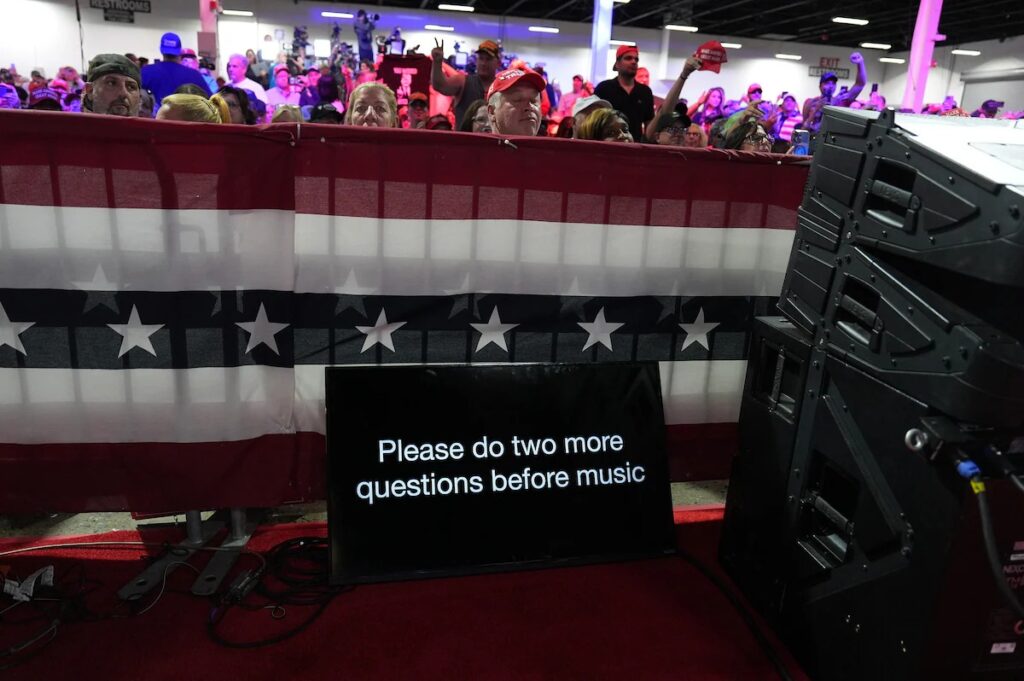
“Those two people that went down are patriots, and we love them,” Trump said, referencing the two attendees who required medical attention earlier in the evening. “And because of them, we ended up with some good music, right?” With that, Trump signaled for the music to continue, and the Village People’s “YMCA” blared from the speakers.
Governor Noem joined in, leading the crowd in the familiar “Y” dance move as Trump swayed alongside her. “Nobody’s leaving,” Trump said as the song drew to a close, adding, “Turn that music up! Great song!”
A Final Musical Tribute Before the End
As the town hall wound down, Trump’s playlist continued with more emotional and iconic tracks. “Nothing Compares 2 U” by Sinéad O’Connor played, followed by Elvis Presley’s “An American Trilogy” and Oliver Anthony’s viral hit “Rich Men North of Richmond.”
Trump stood, swaying to the music, before finally making his exit as Guns N’ Roses’ “November Rain” played in the background. Walking off stage, Trump shook hands with attendees, thanking them for coming, while the final song of the night, “Memory” from Cats the musical, played over the loudspeakers.
The town hall had come to an end, but it was far from a typical political event. For Trump, the evening had morphed into a personal playlist performance, leaving the political questions behind in favor of a musical spectacle that few had anticipated.
This musical town hall, held in Pennsylvania, will likely be remembered as one of the most unusual campaign events in recent memory. As the 2024 election approaches, Trump’s decision to pivot from policy discussions to a playlist of personal favorites continues to spark debate and intrigue among voters and political analysts alike.
Politics
Netanyahu Defends Military Actions at U.N., Rejects Calls for Ceasefire Amid Ongoing Conflict
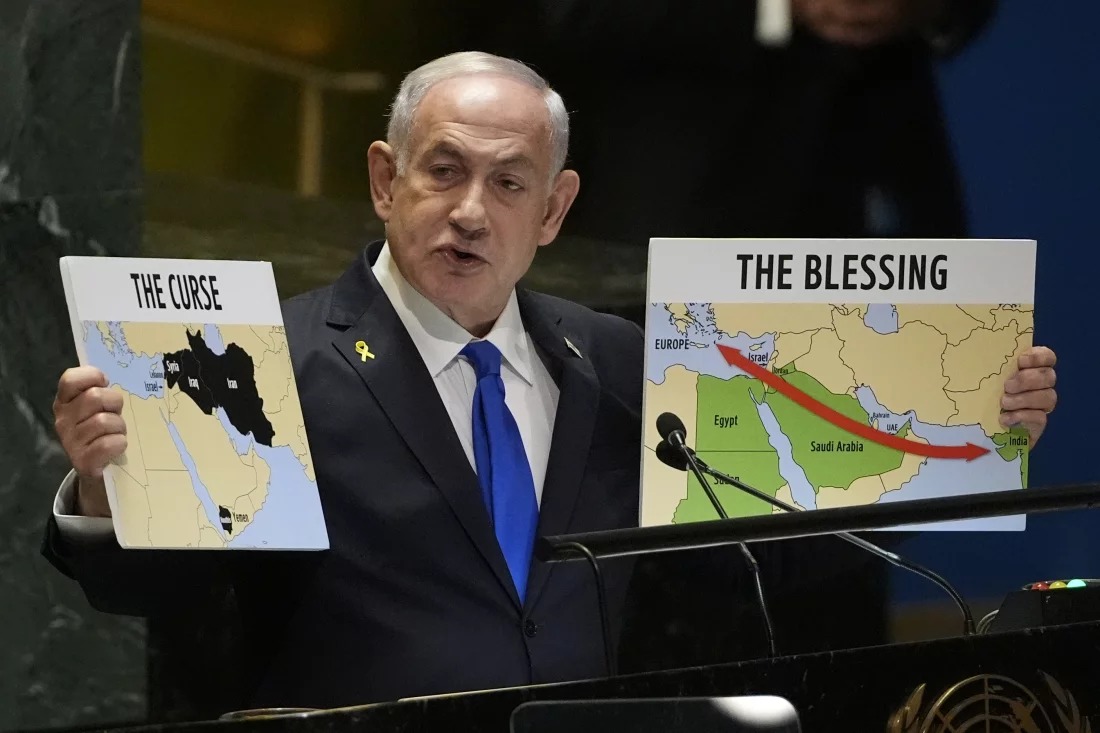
In a defiant speech at the United Nations General Assembly on Friday, Israeli Prime Minister Benjamin Netanyahu reaffirmed Israel’s stance against calls for a ceasefire in its ongoing conflict with Hezbollah and Gaza. Amid escalating military actions, Netanyahu declared that Israel is “winning on multiple fronts” and remains committed to attacking Iran-backed militants across the Middle East.
As Netanyahu addressed the Assembly, Israeli air force jets conducted strikes on Hezbollah targets in central Beirut. The Israeli government claims these locations serve as a key operational base for the militant group, which has been involved in recent escalations.
Netanyahu’s address, which sharply criticized the U.N. for fostering “antisemitic bile,” was met with walkouts from many U.N. delegates. His remarks came after several Arab leaders, including Palestinian President Mahmoud Abbas, condemned Israel’s military actions in Gaza, the West Bank, and Lebanon. Abbas argued that Israel’s response to the October 7 Hamas-led attack has resulted in what he described as a “war of genocide” against Palestinians, accusations which Israel has repeatedly denied.
Despite mounting international pressure for a ceasefire, Netanyahu remained resolute. “Israel yearns for peace,” he said, adding that while Israel has previously made peace, it will continue its military operations until its security objectives are achieved.
Netanyahu’s firm stance has not only sparked controversy abroad but also within Israel, where critics accuse him of using public statements to obstruct peace negotiations. Recent talks, facilitated by the U.S., Egypt, and Qatar, aimed at brokering a ceasefire in Gaza, have reportedly stalled due to Israel’s demands.
Israel’s U.N. ambassador Danny Danon commented on the situation, stating that while diplomacy is preferred, military actions will continue until Israel achieves its goals of ensuring the safe return of 70,000 Israeli citizens displaced by the conflict and the neutralization of Hezbollah in southern Lebanon.
As Israeli forces ramp up airstrikes and mobilize additional reserves near the northern border, Netanyahu is also facing legal challenges. The International Criminal Court has issued a demand for his arrest, accusing him of war crimes related to the conflict, which Netanyahu has dismissed as politically motivated.
The ongoing military campaign and Netanyahu’s diplomatic maneuvering continue to shape the conflict’s trajectory, leaving the prospect of a ceasefire uncertain as tensions in the region remain high.
-

 Health Care2 years ago
Health Care2 years ago7 Surprising Ways to Lower Cholesterol Naturally – No Medication Needed
-

 Entertainment1 year ago
Entertainment1 year agoAustin Abrams Discusses ‘Wolfs,’ Future Projects, and ‘Euphoria’ Season 3
-

 Health Care2 years ago
Health Care2 years agoPink Eye(Conjunctivitis): What Is Commonly MISDIAGNOSED As PINK EYE?
-
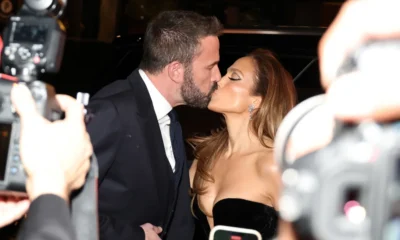
 Celebrity2 years ago
Celebrity2 years agoRelationship Lessons from Jennifer Lopez and Ben Affleck
-

 Entertainment2 years ago
Entertainment2 years agoZendaya Opens Up About Racy Scenes and Family Reactions in New Film
-
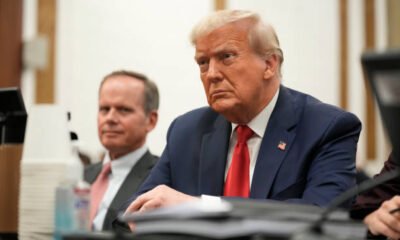
 NEWS2 years ago
NEWS2 years agoIs Trump Going To Jail? Your Questions About Trump’s Trial Answered
-
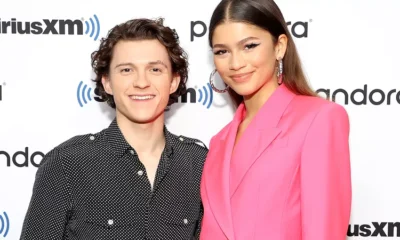
 Entertainment2 years ago
Entertainment2 years agoZendaya and Tom Holland kiss at The London Challengers premiere.
-

 Entertainment2 years ago
Entertainment2 years agoChris Martin and Dakota Johnson reportedly got engaged years ago




